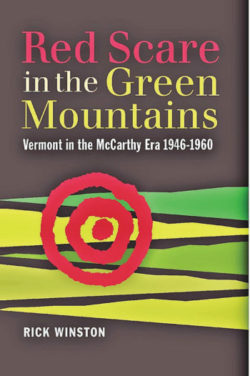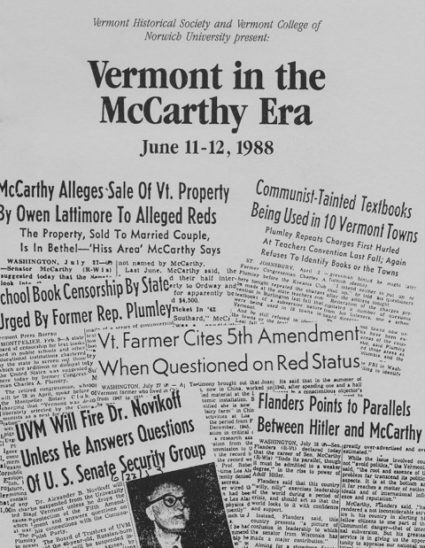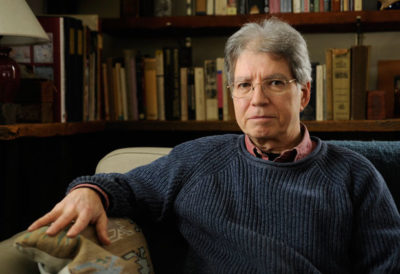Political paradox in Vermont is narrated with insight in Rick Winston’s book.
ROYALSTON, Mass. — There are paradoxes in the politics of Vermont.
When a liberal majority in the state’s legislature in 2000 approved a history-making law authorizing same-sex “civil unions,” conservative Vermonters expressed their outrage by placing “Take Back Vermont” anywhere they could.
Then, in 2009, Vermont became the fourth state to legalize same-sex marriage, the first to do so by legislation rather than a court ruling. The U.S. Supreme Court ruling on this topic didn’t occur until 2015. Now, few people in Vermont, if any, are fretting over this matter.
In the 2016 and 2020 Democratic primaries, Vermont Senator Bernie Sanders, who identifies as a “democratic socialist,” became wildly popular, inspirational to many. He began serving in the U.S. Senate in 2006, and was reelected in 2012 with 71 percent of the vote, and in 2018 with 67 percent.
A century before Sanders, Coolidge became one of America’s leading conservatives.
A century before Sanders achieved fame as a Vermont leftist (actually he was originally from New York City), Vermonter Calvin Coolidge became one of America’s leading conservatives. Coolidge (who had relocated to Massachusetts where he became governor) served as president of the United States from 1923-1929. A 2013 article in a publication of the right-wing Heritage Foundation was entitled “Calvin Coolidge: Forefather of Our Conservatism.” It said:
Calvin Coolidge is the only President in American history born on the Fourth of July. It is appropriate that he bears this distinction, since Coolidge — more so than any other President of the 20th century — embodied a dedication to the principles that the Founders fought to establish in the American Revolution. In addition, he lived at a time when these principles came under radical assault, and Coolidge, a fierce critic of Progressivism, offered one of the greatest defense of these principles. He is an intellectual and political forefather of modern American conservatism.
For much of the 20th Century, Vermont became known as the home of mostly “rock-ribbed Republicans” — referring to both politicians and citizens. That’s the reputation the state had during the years Rick Winston covers in his insightful book, Red Scare in the Green Mouintains: The McCarthy Era in Vermont, 1946-1960 (2018: Rootstock Publishing).
 The paradox that I have suggested here by citing the careers of Sanders and Coolidge is explored by Winston in his well-researched 155-page book. Photos and displays of newspaper headlines provide helpful illustration.
The paradox that I have suggested here by citing the careers of Sanders and Coolidge is explored by Winston in his well-researched 155-page book. Photos and displays of newspaper headlines provide helpful illustration.
Essentially, Winston recounts the demagoguery of the Vermonters who succumbed to the anti-Communism of the initial Cold War years, while also telling about the heroic resistance that took place in this little state — one of the smallest in the union in both population and territory. The author has lived in Vermont since 1970. He teaches film history.
Winston belongs to the same unique fraternity that I belong to — that is, we are both red diaper babies, the children of actual members of the Communist Party. Like many, but not all, red diaper babies, he and I are proud of our parents’ progressive political views while also aware of the angst, difficulty, and danger that came with being a Red at that time. His book’s preface, entitled “Reflections of a ‘Red Diaper Baby,’” includes relevant facts and memories.
In nine chapters, the author details how people succumbed to the hysteria.
In nine chapters, the author details how people succumbed to the hysteria — often because of dogmatic conservatism — and how others fought back. Thus the paradox I mentioned at the opening of this review.
One of the most intriguing narratives comes when Winston tells us how Vermont Republican Senator Ralph Flanders pushed for a censure of Sen. Joseph McCarthy in 1954 and notes that the other Vermont Republican Senator George Aiken somewhat reluctantly also voted for censure. Thinking about how Republicans consistently fail to challenge Donald Trump, I was struck by one newspaper headline that said “McCarthy Doing His Best to Destroy Republican Party, Flanders Charges.”
Readers of The Rag Blog are likely to know something about McCarthy, but just in case you don’t know or need a reminder, here’s a clear sentence from Wikipedia:
Joseph Raymond McCarthy (November 14, 1908-May 2, 1957) was an American politician who served as a Republican U.S. Senator from the state of Wisconsin from 1947 until his death in 1957. Beginning in 1950, McCarthy became the most visible public face of a period in the United States in which Cold War tensions fueled fears of widespread Communist subversion.
Winston wisely reminds his readers that while McCarthy’s name was given to the process of relentless and cruel witch-hunting, the Cold War itself and the rise of virulent anti-Communism was initiated by President Harry Truman.
One of the chapters concerns the 1948 presidential campaign of Henry Wallace.
One of the chapters in the book concerns the 1948 presidential campaign of Henry Wallace and the newly-formed Progressive Party (supported by Communists) to promote the idea of peaceful coexistence with the Soviet Union. It was a hard sell due to the launching of the Cold War and the associated fear mongering, but the campaign, pro and con, had a presence in Vermont.
The explosion of the atom bomb in Japan in 1945, and Truman’s decision to support the development of even more powerful nuclear bombs, moved the United States into a frightening competition with the Soviet Union. American Communists, who admired the Soviet Union and were promoting peaceful coexistence, were characterized as domestic enemies. “Investigations” of Communists and sympathizers began in the nation’s capital and elsewhere. The execution of accused atomic spies Julius and Ethel Rosenberg in 1953 was a key event clearly linked to anti-Communism. Roy Cohn, a major aide to McCarthy, played a vital role in the Rosenberg case.
The Hollywood blacklist became one of the best known aspects of the anti-Communist crusade which included Senate investigations led by McCarthy as well as the House Un-American Activities Committee and similar entities created by some states. Some of the anti-Communist assaults on civil liberties occurred even before the Cold War started. Between 1940 and 1942 in New York State, the Rapp-Coudert Committee sought to identify the extent of Communist influence in the state’s public education system. The Rapp-Coudert Committee was the colloquial name of the Joint Legislative Committee to Investigate the Educational System of the State of New York.
Some of the McCarthyism in Vermont took place on the campus of the University of Vermont in Burlington, the state’s largest city, where Sanders later was elected mayor in 1981. In one of nine chapters devoted to telling the era’s dramas, Winston tells how the university stripped Prof. Alex B. Novikoff of his post for invoking the Fifth Amendment before the U.S. Senate Judiciary Committee. For more details on how universities succumbed to McCarthyism, Winston cites a book by historian Ellen Schrecker entitled No Ivory Tower.
Newspaper publisher William Loeb participated in the assault on the professor.
Newspaper publisher William Loeb, who owned several papers in Vermont and later became famous for the right-wing Manchester (N.H.) Union Leader, participated in the assault on the professor. Novikoff got support from a colleague, Arnold Schein, as well as a local rabbi, Max Wall, but he was fired. Novikoff continued his career elsewhere and returned to Burlington in 1983 to receive an honorary degree and an official apology. On the positive side of media involvement, Democrat Bernard “Bun” O’Shea published the weekly Swanton Courier, which opposed McCarthyism.
The Wallace campaign of 1948 — largely a gesture that favored peaceful coexistence between the U.S. and the Soviet Union — had some Vermonters promoting its overall progressive message (such as lower taxes for farmers in this largely agricultural state). But the anti-Communist hysteria doomed the campaign nationwide and in Vermont. Nationwide, Wallace got 2.4 percent of the votes, and in Vermont only 1.4 percent. Luther McNair, a history professor at Lyndon State College, spoke at a Wallace rally, after which he was denounced and forced to resign. Later, he became executive director of the Massachusetts chapter of the American Civil Liberties Union (ACLU).
In the Vermont towns of Randolph and Bethel, summer residents known for their leftist affiliations become focal points of controversy. One of them was Owen Lattimore, a Central Asia expert who had served the U .S. State Department in China, and was known for welcoming the political changes promoted by the Communists under Mao’s leadership. One newspaper headline said, “U.S.-Born Communists Are Difficult to Spot When They Settle in Vermont.”
In Putney, Vt., the progressive Putney School was founded by Carmelita Hinton, and the small picturesque village tucked in between the Green Mountains and the Connecticut River became the focus of controversy when her son, William Hinton, became well-known and was investigated by the government because of his praise for Mao’s policies in rural China. William Hinton’s book, Fanshen: A Documentary of Revolution in a Chinese Village, published in 1966, became popular among New Leftists.
The book’s final chapter is devoted to William Meyer. In 1958, he became the first Democrat to win a statewide or Congressional election in Vermont since 1853. A “smear campaign” by Republicans – focusing in part on Meyer’s support for admitting “Red China” to the United Nations, was a factor in Meyer’s defeat in 1960. Later, Meyer served as a political mentor to Bernie Sanders.
I’ll end this with Winston’s own ending, written as the Trump era was underway:
Richard Hathaway wrote in 1988 that “we have yet to comprehend fully the legacy of McCarthy and McCarthyism.” That statement is still true 30 years later. The definitive history of this era in Vermont is still to be written. I have described nine episodes that illustrate the range of principled opposition, timid acquiescence, and strident demagoguery. Across the nation, at the current moment, we are witnessing a resurgence of the forces that, in 1950, Senator Margaret Chase Smith of Maine called the “Four Horsemen of Calumny: Fear, Ignorance, Bigotry and Smear.” Vermont may be tested once again.
[Since 1973, Allen Young has lived in Royalston, Mass., just 25 miles from the Vermont state line. He has traveled all over the Green Mountain state where he has many friends and relatives. He received the University of Massachusetts English Department’s Writing and Society award in 2004. His 2018 autobiography is entitled Left, Gay & Green: A Writer’s Life. He worked for Liberation News Service from 1967-1970.]
- Read more articles by and about Allen Young on The Rag Blog.




















Regarding Owen Lattimore—My great uncle, John DeFrancis, was an assistant professor of Chinese in Owen Lattimore’s department at Johns Hopkins University. He defended Lattimore and refused to rat on anybody. He was fired in 1954 and blacklisted, unable to get a job in his field until 1967 when the University of Hawaii hired him. He lived in Hawaii the rest of his life, dying at age 98, having outlived all of his persecutors.
From Jonah Raskin:
I read with great interest Allen Young’s review of Rick Winston’s book about the Red Scare in Vermont, a state I knew as a boy and that still occupies a warm spot in my heart, though Vermont winters can he cold. Allen is right to connect McCarthyism to gay bashing and to link the past to the present day. I think Rick Winston is also spot-on when he says that the definitive book about McCarthyism, aka Nixonism, hasn’t yet been written. Winston’s book shows that the Red Scare not only played itself out in the nation’s capital, but also far from the White House and in small towns and communities like those in Vermont. I enjoyed reading about Owen Lattimore and the Putney School and I wholeheartedly recommend the award-winning Red Scare in the Green Mountains: The McCarthy Era in Vermont, 1946-1960, whether or not your parents or grandparents were Reds or liberals, worked for corporations or enlisted in the military to fight Commies. With Trump in the White House, Mitch McConnell in the Senate, and the right-wing mob nearly everywhere another Red Scare is around the next corner. Alas, in the U.S. and other parts of the world, bashing socialists and homosexuals hasn’t gone out of fashion.
Allen, I first became aware of Roy Cohn when I was 18 going on 19 and a newly-wed living in Chicago 1954. I had some genetic links to Vermont earlier when my great grandfather Grove Hall left MA and lived in Southern Vermont a few years on his way west and later in my own life when as a single mother of a girl and a boy I took a job teaching in a high school in St. Albanys VT. However in 1954 I watched the McCarthy-Army Hearings being televised in entirety. We in Chicago along with most of the USA watched Sen Joe McCarthy, Roy Cohn, a very young Robt Kennedy, and an impressive James Welch lead us through this drama. I think most of our country was going through similar hopes, fears, and political divisions as Vermont. Alan. you are accurate in pointing out our fears about the Abomb, and Russia consolidating around communism under Stalin. Later when I attended college at Northern IL University near Chicago, I learned more about the persecution of left leaning college professors in the east from two of my history professors who had fled their own pressures. And of course from red diaper babies like you later in life. I enjoyed your insightful review as I am still wanting to know our USA stories.